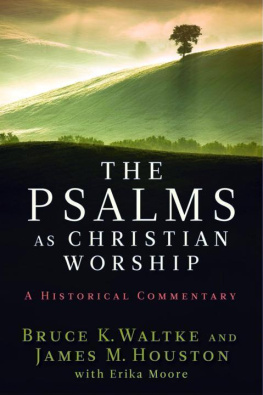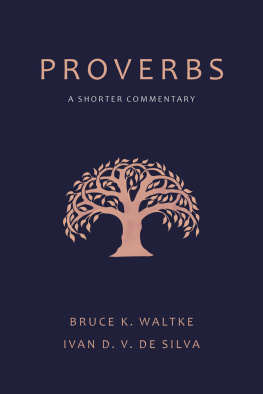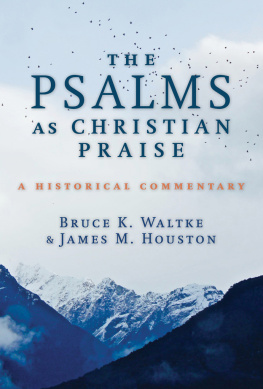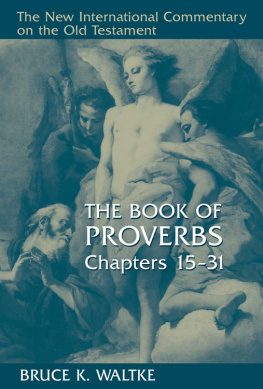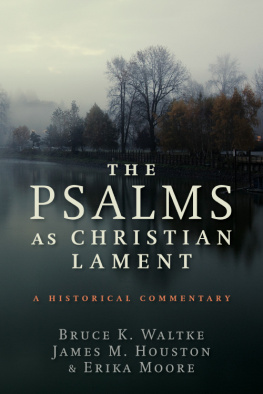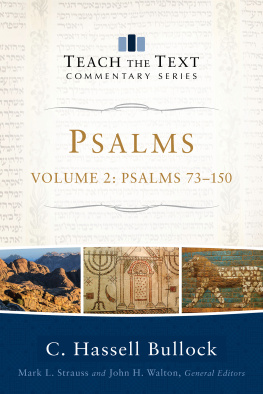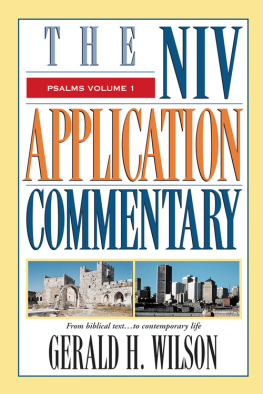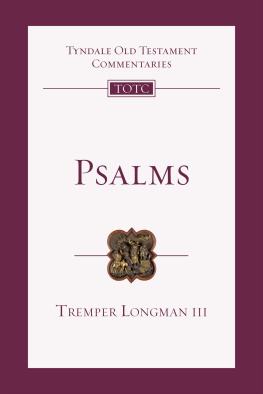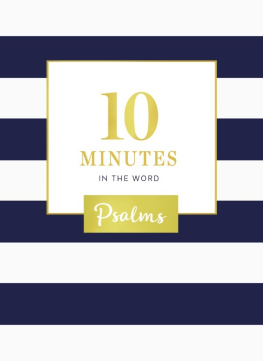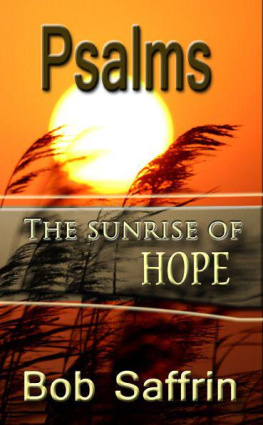THE PSALMS AS CHRISTIAN WORSHIP
The Psalms as Christian Worship
A Historical Commentary
Bruce K. Waltke & James M. Houston
With
Erika Moore





CONTENTS
PROLOGUE
SECTION I SURVEY OF HISTORY OF INTERPRETATION OF THE BOOK OF PSALMS
SECTION II COMMENTARY ON SELECTED PSALMS
PROLOGUE
1. COMMENTARY'S HISTORY
Professor Bruce Waltke has been teaching and preaching the book of Psalms throughout his teaching career, beginning in 1958. His career includes teaching courses on the book of Psalms as a whole and on the practice of exegesis, in which he uses selected psalms as textbook examples. At the end of his career he thought it fitting to put the fruit of his work into writing.
We hope that our readers will be edified, at least to some extent, as we have by our interaction. Jim and Bruce respectively take responsibility for the history of Psalter interpretation and for its exegesis.
Erika Moore, Associate Professor of Old Testament at Trinity School for Ministry, volunteered her help to produce the commentary. Jim and Bruce gladly accepted her offer and asked her to write the Psalter's history during the Second Temple Period (chapter 1). She also graciously prepared the glossary and indices.
II. COMMENTARY'S OBJECTIVE: AN APOLOGIA
This lack calls for a defense of our interdisciplinary approach. Jim and Bruce present apologias respectively for hearing the believing response of the church and for an accredited exegesis. Though presenting separately, the authors are in full agreement with each other's apologias.
A. Hearing the Voice of the Believing Church
Psalms were and are of key importance in the daily life of the Christian and in Christian community worship. Both were the basic features of early Christianity, since it was believed by the early Christians that Jesus Christ himself lived within the Psalms. The early fathers of the church, in contrast to much modern scholarship, rightly believed in the maxim that "Scripture interprets Scripture." The incident of the risen Christ asserting to the two disciples on the Emmaus way the hermeneutical principle that all the Scriptures, including the Psalms, speak of Christ set a basis for the early church thinkers to interpret the Bible as the book about Christ (Luke 24:13-49). The radical power of "the Spirit" over "the letter" introduced the centrality of Christ into apostolic exegesis of the Old Testament - especially in the Psalms - in a totally new way.
Around this new hermeneutical principle of "interpreting Scripture by Scripture" the early Fathers developed "The Rule of Faith," which now determined how exegesis should be done. Augustine in his De doctrina christiana demarcates clearly that the principles of theological enquiry and the claims for truth are distinctive, when they are "Christian." Christian scholarship is now contrasted with classical scholarship in important ways, even when classical procedures for rhetoric are still imitated, and then modified.
Scholarly questions about authorship, psalm classifications, pagan origins of Canaanite and Ugaritic sources, cultic or non-cultic sources of worship, the changing roles of the psalms, all tend to detract, indeed as Kugel argues, to "de spiritualize" them for their use today, by secular scholars whether "Jews" or "Christians."
Yet, paradoxically, historical studies flourish more than ever, as ideologies wilt and worldviews change. For "the past" is now viewed as the source for multiplying differing perspectives, through the lens of receptor-commentary. Scholarly attention is now being given to "history" as a series of anthropological studies, of which "the history of Biblical commentaries" is traceable through its sequence of historical cultures and "paradigm shifts." "Historiography" then becomes more confused and complex in its usage. For there are multiple reasons for using "history" as a tool of scholarship, as well as using "commentary" for Biblical studies. Since both Judaism and Christianity have been faiths of "the Book;" secular literary criticism challenges them deeply. The history of doctrine is intertwined with the history of exegesis of the Scriptures, to make this the new battlefield for faith against skepticism.
Nevertheless, the increasing number of scholars who are now reviewing the history of previous commentaries is a welcome new trend in Biblical scholarship (see pp. 12-13).
B. Hearing the Voice of the Inspired Author
Martin Luther taught, "If God does not open and explain Holy Writ, no one can understand it; it will remain a closed book, enveloped in darkness." The Geneva Catechism (1541) put it this way: "Our mind is too weak to comprehend the spiritual wisdom of God which is revealed to us by faith, and our hearts are too prone either to defiance or to a perverse confidence in ourselves or creaturely things. But the Holy Spirit enlightens us to make us capable of understanding what would otherwise be incomprehensible to us, and fortifies us in certitude, sealing and imprinting the promises of salvation in our hearts."
1. Empirical Text Demands a Scientific Approach
On the other hand, a scientific investigation of the text's empirical data is also necessary for an accredited hermeneutic. By scientific we mean the grammatico-historical approach, interpreting words within the context of the speaker's world. The Bible itself uses this approach, explaining words not understood by the audience (cf. 1 Sam. 9:9) and explaining customs that had become otiose at the time of writing (cf. Ruth 4:7). Orthodox theology demands this approach, for it confesses the authors of the Bible were inspired by the Spirit of God to reveal the mind of God to his covenant people and that he did so in words that demanded faith and obedience.
2. New Testament Validates Orthodoxy by Text's Plain Sense
"How foolish you are, and how slow to believe all that the prophets have spoken! Did not Messiah have to suffer these things and then enter his glory?" (Luke 24:25-26). Christ rebuked these disciples for not believing what should have been apparent upon a plain reading of the text. He did not rely upon the faulty pesher method of hermeneutics to validate his claims, as the Teacher of Righteousness at Qumran had done, or on the allegorical method of the Church Fathers. The failure to see Christ in the Psalms is not due to the grammatico-historical method of exegesis but to the slowness of the human heart to believe in the death of Christ for sin and in his resurrection from the dead. Indeed, it takes the Holy Spirit to remove this veil of unbelief. "The radical power of `the Spirit' over `the letter' that introduced the centrality of Christ into apostolic exegesis of the Old Testament in a totally new way in the history of interpretation," as Jim so well puts it, is due to God's grace that "has now been revealed through the appearing of our Savior, Christ Jesus, who has destroyed death and has brought life and immortality to light through the gospel" (2 Tim. iao), not to negating the plain sense of Scripture. Instead of focusing on the letter of the Law as the rabbis had done, they focused on the gospel of Jesus Christ: his death for the church's sins, his burial, his bodily resurrection and ascension, according to the Scriptures' plain sense. In sum, the veil of unbelief, not of philo logical and historical ignorance, had to be lifted for the radical power of the Spirit to empower an accredited reading of Scripture.

